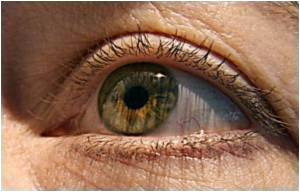
The disease AMD involves loss of central vision, people with advanced disease being unable to read, watch TV, enjoy the cinema, drive, or use a computer - in short, everyday living becomes very difficult.
The key diagnostic feature of AMD is the presence of "drusen", which are recognised during an eye exam as yellowish/white deposits in the central region of the retina called the macula.
Dry AMD is characterised by the presence of excessive amounts of drusen and there are currently no forms of therapy other than recommended lifestyle changes such as giving up smoking, which is a recognised risk factor.
However, a significant number of cases of the "dry" form of AMD can progress to the "wet" form, where blood vessels underneath the retina begin to grow, leading to central blindness. If you hold two coins immediately in front of your eyes, you will see a single large black circle blocking out your central vision.
This is a very realistic simulation of what it is like to live with advanced disease.
Advertisement
These findings were based on studies involving drusen isolated from donor AMD eyes in tandem with pre-clinical studies on models of the disease.
Advertisement
"The progression from "dry" to "wet" AMD appears to be mediated by the inflammatory component IL-18, our results directly suggest that controlling or indeed augmenting the levels of IL-18 in the retinas of patients with dry AMD could prevent the development of the wet form of disease, which leads us to an exciting new prospect for a novel therapy for AMD" added Dr Doyle.
The study has been published in the international medical journal, Nature Medicine.
Source-ANI












